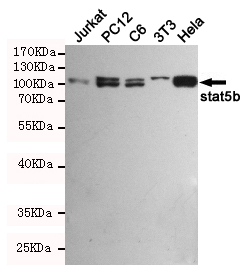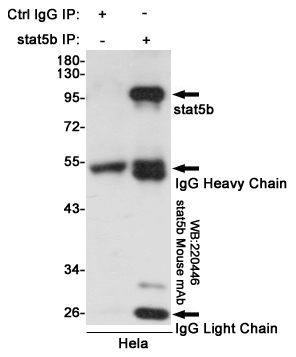-
Product Name
Anti-STAT5B (7H9) Mouse antibody
- Documents
-
Description
STAT5B (7H9) Mouse monoclonal antibody
-
Tested applications
WB, IP
-
Species reactivity
Human
-
Isotype
Mouse IgG1
-
Preparation
Antigen: Purified recombinant fragment of human STAT5B expressed in E. Coli.
-
Clonality
Monoclonal
-
Formulation
Ascitic fluid containing 0.03% sodium azide.
-
Storage instructions
Store at 4°C short term. Store at -20°C long term. Avoid freeze / thaw cycle.
-
Applications
WB: 1/500 - 1/2000
ELISA: 1/10000
-
Validations

Western blot detection of stat5b in Jurkat,PC-12,C6,3T3 and Hela cell lysates using stat5b mouse mAb (1:1000 diluted).Predicted band size:90KDa.Observed band size:90KDa.

Immunoprecipitation analysis of Hela cell lysates using stat5b mouse mAb.
-
Background
Swiss-Prot Acc.P51692.The protein encoded by this gene is a member of the STAT family of transcription factors. In response to cytokines and growth factors, STAT family members are phosphorylated by the receptor associated kinases, and then form homo- or heterodimers that translocate to the cell nucleus where they act as transcription activators. This protein mediates the signal transduction triggered by various cell ligands, such as IL2, IL4, CSF1, and different growth hormones. It has been shown to be involved in diverse biological processes, such as TCR signaling, apoptosis, adult mammary gland development, and sexual dimorphism of liver gene expression. This gene was found to fuse to retinoic acid receptor-alpha (RARA) gene in a small subset of acute promyelocytic leukemias (APLL). The dysregulation of the signaling pathways mediated by this protein may be the cause of the APLL.
Related Products / Services
Please note: All products are "FOR RESEARCH USE ONLY AND ARE NOT INTENDED FOR DIAGNOSTIC OR THERAPEUTIC USE"
